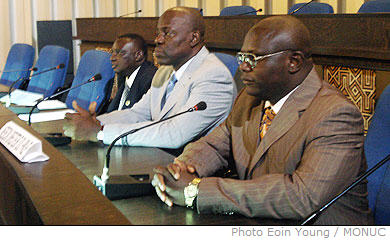World Malaria Day was celebrated in Kinshasa this Friday 25 April 2008 in the DRC Ministry of Foreign Affairs, by the DRC Ministry of Health and its national and international partners. A call was made for better partnership and coordination among the various actors in the fight against the epidemic, which kills thousands of Congolese every year. 
Mr. Komba Djeko, representing DRC Health Minister Victor Kaput, said that “malaria is an epidemic which is at the centre of the degradation of the health of our communities, and the degradation of our country’s economic situation.”
Malaria is the main cause of death in the DRC for children under the age of five, and is also responsible for a considerable number of deaths of older children and adults. The most vulnerable to malaria are infants, children, pregnant women, displaced people and those living with HIV/ AIDs.
In response to malaria’s negative effects, the DRC government has donated insecticide impregnated mosquito nets since 2006, in Bas Congo and South Kivu. Further campaigns will continue in Equateur and Kinshasa later this year.
The 2011 government objective is to reach accessibility to malaria treatment for all, and minimum insecticide impregnated mosquito nets population coverage of 80%.
“World Malaria Day which we celebrate today should not be a day of anxiety and fear. On the contrary, it should be a day of determination and hope,” Mr. Djeko concluded.
The main challenges in the fight against malaria in the DRC are numerous. They include better access for the population to treatment, the reinforcement of the follow up and evaluation systems, a better coordination between the different partners, and better sensibilisation on the dangers of malaria.
As part of their DRC anti malaria programme, UNICEF have a policy of donating insecticide impregnated mosquito nets to all children under the age of five, as well as funding medical training and sensibilisation campaigns.
The United Nations Development Programme (UNDP) is one of the major partners in the fight against malaria in the DRC, allocating $54 million in funding over the next five years.
Their five main areas of intervention are insecticide impregnated mosquito nets, medical training, improving treatment for patients, better management of the fight against malaria and support for pregnant women.
Other important partners in the fight include the World Health Organization, the World Bank, USAID, Population Services International and the National Programme in the Fight Against Malaria.
Related articles
- • 'Deadly environment' plus 'political and social' obstacles hinder Ebola fight, Security Council hears (July 24, 2019)
- • Ebola outbreak declared an international Public Health Emergency (July 17, 2019)
- • DR Congo: The country that knows how to beat Ebola (December 11, 2014)
- • Ebola Epidemic Resurfaces in DR Congo's Equateur Province (August 25, 2014)
- • Tshisekedi Says He Won, Can He Prove It? (December 17, 2011)
- • Kabila Leads Partial Election Results (December 3, 2011)
- • 32 Million Congolese Voters Set to Elect Their Leaders (November 27, 2011)
- • Candidates to Make Last Stand in Kinshasa before Monday's Election (November 26, 2011)
- • Tshisekedi's Mental Health Called into Question after Incoherent Statements (November 8, 2011)
- • 19,497 Candidates to Run for 500 Seats in Parliament (September 26, 2011)
- • At least 50 Dead after Two Boats Collide on Ruki River (July 29, 2011)
- • UN high-level HIV-AIDS meeting continues with progress reports (June 9, 2011)
- • Rape study 'questionable' (May 18, 2011)
- • Kabila, Sassou meet in Kinshasa over security (April 16, 2011)
- • DR Congo Recalls Ambassador to Brazzaville (March 26, 2011)
- • 2010 Human Development Report analyses long-term development trends (November 4, 2010)
- • DR Congo improves education, child survival but greater efforts needed - UN (October 6, 2010)
- • Government Launches Investigation into Latest Boat Accidents (September 6, 2010)
- • Key excerpts from UN report on Rwandan army genocide in DR Congo (August 27, 2010)
- • Equateur Province Governor Bans Exports of Unprocessed Timber (July 7, 2010)
- • President Kabila Pays Respects to Sange Victims (July 5, 2010)
- • Leader of Enyele Rebels Arrested in Equateur (May 5, 2010)
- • DR Congo army regains control of Mbandaka (April 4, 2010)
- • Enyele rebels enter major city in Equateur province (April 4, 2010)
- • Blue helmets protect thousands daily, says top UN envoy (December 28, 2009)
- • DR Congo armed forces enter troubled Dongo area (December 15, 2009)
- • Ban Ki-moon deplores attack on UN helicopter in DR Congo (November 27, 2009)
- • Goma: MONUC's hospital provides essential support to the mission and the FARDC (November 18, 2009)
- • African development needs more actions, less words (August 15, 2009)
- • Jean-Pierre Bemba Allowed to Attend Mass for His Father in Brussels (July 7, 2009)
Tags: |







